Americans want a tough approach to nuclear talks

Editor’s note: The Center for Security Policy gratefully acknowledges its collaboration with tippinsights on the simultaneous and exclusive release of this important story.
President Biden has made it clear that the U.S. will re-join the 2015 Iran nuclear deal (the JCPOA) if Iran returns to compliance. An agreement could be reached within weeks, according to the New York Times. NBC News reported that the administration is considering rolling back sanctions significantly to come to an agreement.
The administration’s goal to re-enter the deal, and the offer of lifting sanctions on Iran to do so, does not have broad support among the American people.
While Americans are split on their perception of the JCPOA, a plurality thinks that it was a bad deal. Most believe that if Iran gets money, it will divert the funds to terrorism against the U.S. and Israel. Most of those following the Iran nuclear deal story want to use sanctions to compel Iran to negotiate an acceptable deal rather than revert to the 2015 deal. Further, most want Iran to release hostages before any sanctions relief is granted. Americans also want the U.S. to maintain terrorism sanctions irrespective of the outcome of the nuclear talks.
These are the key findings of the TIPP Poll completed in late April.
American perception Of The 2015 Deal
Just over a quarter of Americans, 27%, feel that the Iran Nuclear Deal is good for America. A significantly higher percentage, 38%, believes that the deal is bad for the U.S, while about the same number, 35%, are undecided either way.
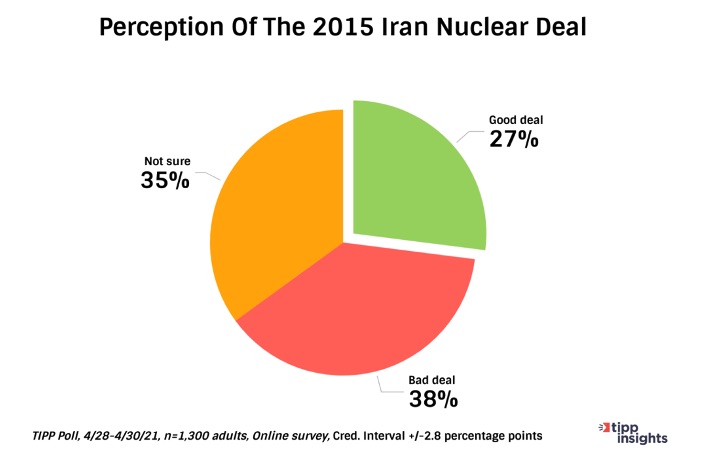
Americans Believe Iran Will Divert Funds to Terrorism
Iran’s link to and active support of terrorist organizations to achieve its goals is well documented. The clerical regimes’ support for the Hamas in Palestine, Hezbollah in Syria, its questioning of the ‘legitimacy’ of Israel, and targeting Americans worldwide have been detrimental to the peace and stability of the region.
TechnoMetrica survey found that most Americans believe that funds given to Iran will be diverted to foster terrorism. More than half of those who participated in the study on Iran, 61%, believe that the country will redirect funds to terrorist activities against the U.S. and Israel. Only a tiny minority, 17%, don’t subscribe to this view.

The poll found that only 41%, less than half of Americans, closely follow the issue. TechnoMetrica posed subsequent questions about the nuclear deal to those who were following the story.
Most Favor Increased Pressure Over Reverting to the 2015 Deal
While negotiations are on to reach a consensus with Iran, opinions are divided on what approach to take. While a minority believes that going back to the original JCPOA will suffice, most want stricter measures to bring Iran in line.
TechnoMetrica survey revealed that the majority of Americans favor maintaining or increasing sanctions against Iran. A considerable majority, 63%, favored America maintaining or increasing sanctions to force Iran to renegotiate the nuclear deal. About a quarter, 26% of the respondents, thought it was acceptable for the U.S. to return to the original 2015 deal. A small portion of those surveyed, 11%, were undecided on what approach to take.
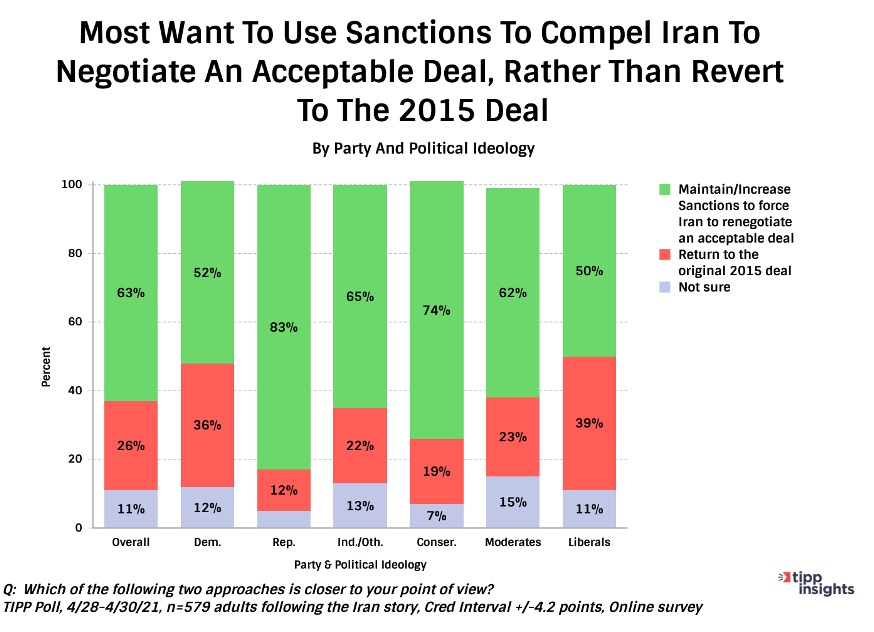
Most Want Hostages Released Before Giving Iran Any Sanctions Relief
Another source of grave concern, though not directly related to the nuclear deal negotiations, is the Westerners (Americans, Britons, and Germans) who are being held hostage or imprisoned by Iran. The U.S. administrations have been working relentlessly to ensure their safe return home.
The TechnoMetrica poll found that Americans wanted the safe return of all U.S. hostages, even at the cost of the nuclear deal. A bulk of the survey respondents, 64%, believed that the U.S. should demand the release of all Americans held hostage in Iran before giving Iran any sanctions relief, even if it means Tehran won’t agree to limit its nuclear program. A shade more than a quarter, 27%, felt it was more important to limit Iran’s nuclear program and to achieve this goal, sanctions against the country could be lifted.
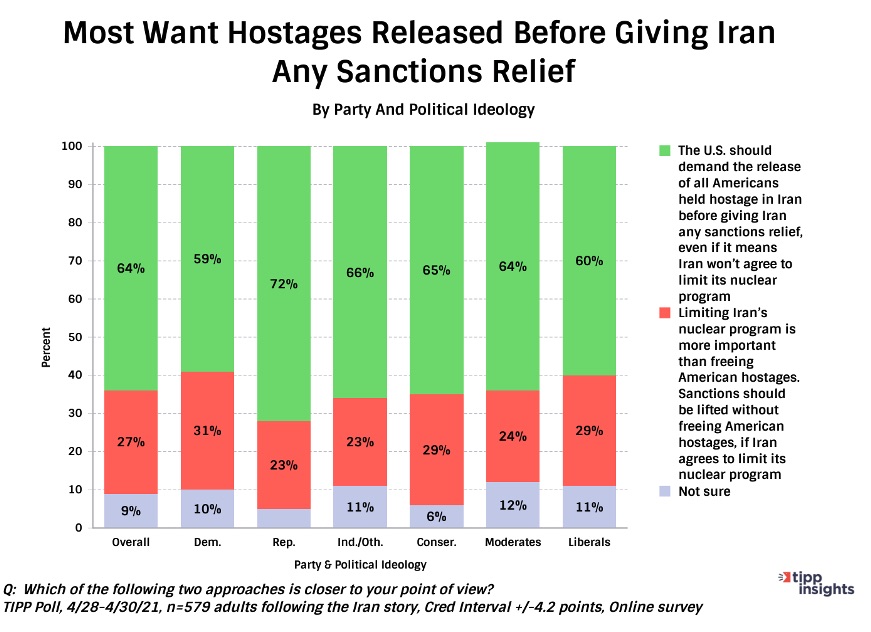
The U.S. Should Maintain Terrorism Sanctions on Iran Irrespective of the Outcome of the Nuclear Talks
The U.S. has imposed sanctions on Iran for pursuing nuclear activities and for abetting terrorism. In the TechnoMetrica survey, most Americans view terrorism and nuclear deal talks as separate issues. While more than half, 56%, wanted America to maintain terrorism sanctions on Iran irrespective of the outcome of the nuclear negotiations, a smaller section, 35%, favored lifting both nuclear sanctions and terrorism sanctions on the country to limit its nuclear program.
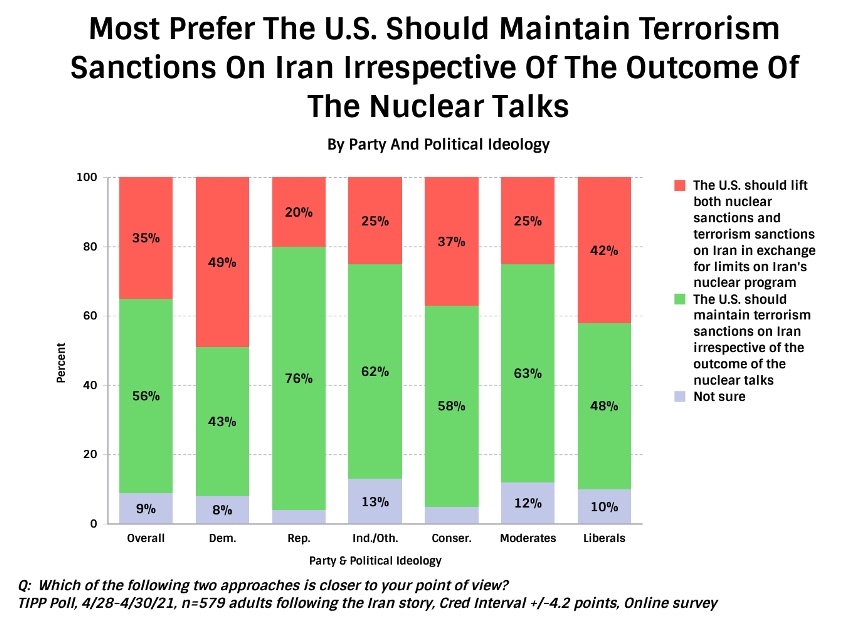
What Should the U.S. Do If Iran Nuclear Talks Fail?
The TIPP Poll also asked how the U.S. should respond if the talks fail. The following summarizes the responses:
- 31% said increase sanctions
- 19% reengage in diplomatic discussions
- 16% attempt to disrupt Iranian nuclear production (physically)
- 13% allow another country, such as China or Russia, to facilitate the terms and outcomes
- 11% allow Israel to take command
- 10% not sure
One-half of Americans, regardless of party affiliation or ideological leaning, support one of the top-two approaches.
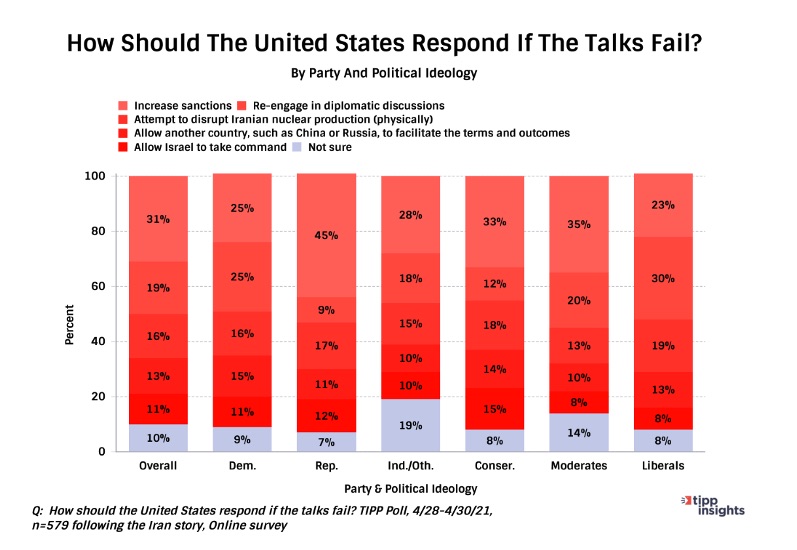
Conclusion? Americans would like to see the Vienna talks yield a comprehensive nuclear deal that will effectively curb Iran’s nuclear arms ambitions. The question is, how much to cede to or appease the regime to bring it in compliance with international goals.
About The Survey
TechnoMetrica conducted The TIPP Poll, an online survey from April 28 to April 30. The nationwide study had a sample of 1,300 Americans, 18 or older, and TechnoMetrica’s network of panel partners provided the study sample. Upon the study completion, TechnoMetrica weighted the study dataset by gender, age, race, education, and geographical region to mirror known benchmarks such as the U.S. Census. The credibility interval (CI) for the survey is +/- 2.8 percentage points, meaning the study is accurate to within ± 2.8 percentage points, 19 times out of 20, had all Americans been surveyed. Subgroups based on gender, age, ethnicity, and region have higher credibility intervals due to smaller sample sizes. The credibility interval (CI) for the subset of Americans following the Iran story is larger +/- 4.2 percentage points.
Mark Pfeifle was deputy national security advisor for strategic communication and global outreach at the White House from 2007 to 2009. Mark was the lead interagency coordinator for communication implementation, leading the successful effort to promote the “surge” of U.S. forces into Iraq in 2007, initiatives to de-legitimize al Qaeda, stop Iran from enriching uranium, denuclearize North Korea and advocate for freedom, liberty and human rights for those suffering under brutal dictatorships. In the private sector, Mark led initiatives for National Sheriffs’ Association, U.S. Space Command, U.S. Homeland Security Department’s S&T Human Factor Division and U.S. Central Command. Pfeifle was awarded the US Army’s Outstanding Civilian Service Award for “dramatically improved communication planning and strategies…in support of the Global War on Terror” in 2009.
